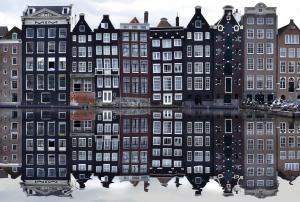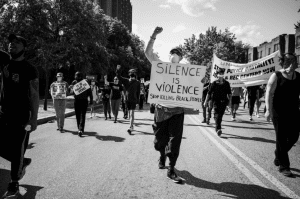The last couple of weeks have taken a lot out of me. I tried twice to write posts, and just didn’t have the energy to.
I’m increasingly without hope that the transition to the next administration will take place without violence. No matter who wins. Trump’s refusal even to make a throwaway statement about a peaceful transfer of power was grim. I didn’t think he’d mean it, but I thought he’d bother to lie. And that was before his disgusting call to readiness for the violent shitheads known as the Proud Boys in tonight’s debate.
This is a dark place to be. This doesn’t feel like the country I grew up in any more.
I still can’t seem to write much at the moment, so for my next two or three posts, I’ll just put up a few excerpts from a book that is very precious to me. That book is The Hiding Place. It is the memoir of Corrie ten Boom, a Dutchwoman from the city of Haarlem, not far from Amsterdam. With her father Casper and her sister Betsie, Corrie helped conceal Jews from the Gestapo and smuggle them into Allied territory. Ultimately the ten Booms were caught and thrown in concentration camps. Only Corrie survived. My mother read it to me and my sisters when I was maybe eight—I used to think that was awfully young to start learning about the Holocaust, but it shaped me, and I’m glad of that. (Naturally I won’t be charging for these posts on Patreon.)
This first passage (which I’ve edited and shortened a bit) comes from near the beginning of the book. The ten Boom family were throwing a hundredth anniversary party for their watch shop, though really the community was turning out to celebrate Casper, a generous, pious, and much-beloved patriarch of Haarlem.
A full ten years ago, way back in 1927, Willem [Corrie’s brother] had written in his doctoral thesis, done in Germany, that a terrible evil was taking root in that land. Right at the university, he said, seeds were being planted of a contempt for human life such as the world had never seen. The few who read his paper had laughed.
“What does he want?” I asked a group of men gathered around the cake table as I set down the pot. “This man in Germany, does he want war?” I knew it was poor talk for a party, but somehow thoughts of Willem always set my mind on hard subjects. A chill of silence fell over the table and spread swiftly around the room. “What does it matter?” a voice broke into it. “Let the big countries fight it out. It won’t affect us.” “That’s right!” from a watch salesman. “The Germans let us alone in the Great War. It’s to their advantage to keep us neutral.”
And at that moment Willem entered the room. Behind him came Tine, his wife, and their four children. But every eye in the room had settled on the figure whose arm Willem held in his. It was a Jew in his early thirties in the typical broad-brimmed black hat and long black coat. What glued every eye to this man was his face. It had been burned. In front of his right ear dangled a grey and frazzled ringlet, like the hair of a very old man. The rest of his beard was gone, leaving only a raw and gaping wound. “This is Herr Gutlieber,” Willem announced in German. “Herr Gutlieber, my father.”
“He got out of Germany on a milk truck,” Willem told us rapidly in Dutch. “They stopped him on a streetcorner—teen-aged boys in Munich—set fire to his beard.”
Father had risen from his chair and was eagerly shaking the newcomer’s hand. I brought him a cup of coffee and a plate of Nollie’s cookies. Herr Gutlieber sat down stiffly on the edge of a chair and fixed his eyes on the cup in his lap. I pulled up a chair beside him and talked some nonsense about the unusual January weather. And around us conversation began again, a hum of party talk rising and falling.
“Hoodlums!” I heard the watch salesman say. “Young hooligans! It’s the same in every country. The police’ll catch up with ’em—you’ll see. Germany’s a civilized country.”













